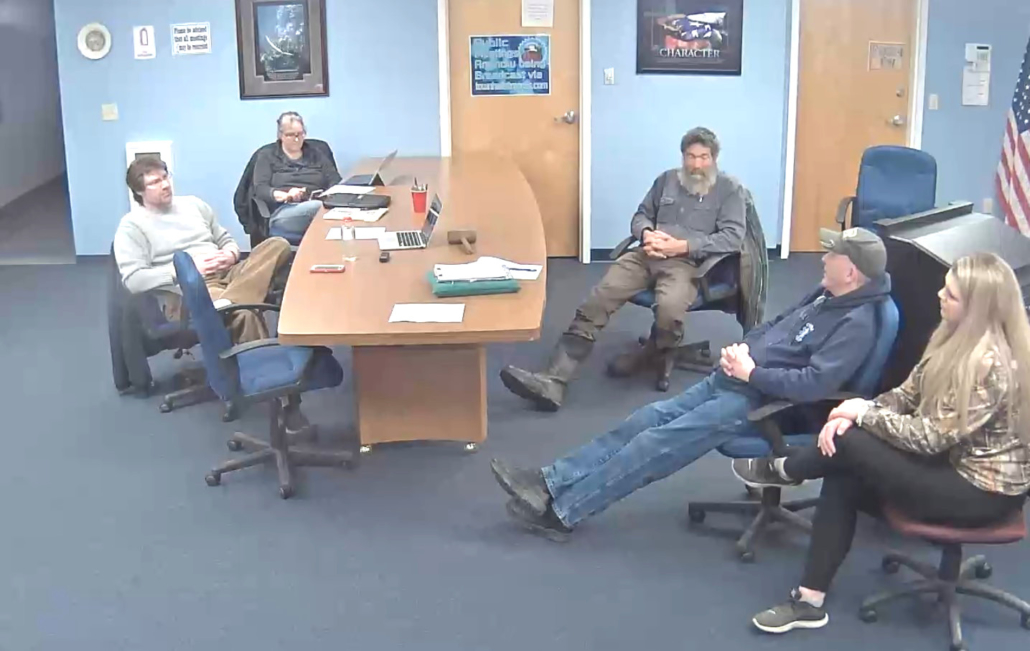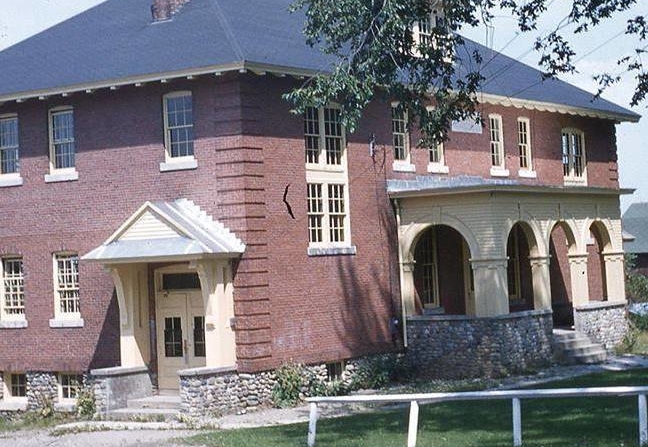CFAL committee meets to discuss volunteer needs and efforts

CFALC members, left to right, Eric Austin, Jeanne Marquis, Christopher Hahn, and Dan McKinnis. Out of frame, Laurie Lizotte, Ann Austin, Irene Belanger, and Theresa Wight. (contributed photo)
by Eric W. Austin
On March 19, the China for a Lifetime Committee (CFALC) met to discuss the best ways to provide assistance to members of the community that are especially vulnerable during the COVID-19 pandemic. This includes high risk individuals like the elderly or those with underlying respiratory conditions which makes possible infection especially dangerous.
Five members of the committee gathered in the main conference room at the town office, sitting at least six feet apart as advised by the CDC, and others logged into a conference call set up for the purpose or watched the meeting live via the town’s live streaming service. The committee was also joined by Dan McKinnis, China Rescue Chief, who advised the committee on important safety measures, and Theresa Wight, from Head Start, who spoke about her work to supply food to needy area families with young children. China town manager, Dennis Heath, watched the meeting live and supplied suggestions via text chat.
McKinnis, who reminded the team that he was not an expert on the coronavirus but relied on best practices set down by the Maine CDC, told the group that it is important that they treat everyone as a potential infection risk. Gloves can be an important safety measure, but the Maine CDC has warned that gloves can also make people less cautious. Gloves need to be changed or washed as often as one would wash your hands, as any contamination on the gloves can then be easily transferred to other surfaces.
McKinnis also spoke of the difficulties of local EMT and first responders, who are on the front lines of the current crisis. Like others, they are fearful of contracting the virus themselves or bringing a possible infection home to their families. In response to the current situation, the dispatch officers who receive 911 calls are now asking qualifying questions to classify people into three possible categories: positive, negative or undetermined. These categories are helping first responders determine the risk level in responding to calls. So far, said McKinnis, China Rescue has not had any calls from likely positive individuals, but they have adjusted their procedures as a cautionary measure. If they do get a call from an individual who could be infected with the virus, they can suit up in gowns and masks for safety, but since these items are disposable and their supplies are limited, they must carefully assess each situation and respond accordingly.
McKinnis recommends that everyone practice social distancing as advised by the CDC, and suggests that those without cleaning supplies can soak a paper towel in a solution of bleach and water to wipe down frequently touched surfaces such as door handles, steering wheels, light switches and eating surfaces. The CDC recommends a solution of five tablespoons (1/3 cup) of bleach per gallon of clean water for this purpose.
Rescue Chief McKinnis also recommended to the China for a Lifetime Committee that any food deliveries to needy residents be left on front porches without contact with the resident, that no one go into the house of a resident they are helping, and that transporting anyone – such as to doctor’s appointments – should not be done because of the possible risk of contamination.
Theresa Wight, who works for the local Head Start office, spoke about the food insecurity faced by the families in her program. Currently she works with 14 local families who are finding it difficult to feed their children with local schools closed. This led to a discussion of how to identify local families in need.
The China for a Lifetime Committee has several ways for local residents to get in contact with the committee and let them know what needs they have. Residents who need help may send an email to ChinaforaLifetime@gmail.com or call the China for a Lifetime hotline at 207-200-3704. This is a voicemail-only number, but the messages are regularly checked and you will be called back as soon as possible. Please leave your name, age, phone number and explain your current need.
There are also several active Facebook groups where residents can post requests or suggestions. One is the “Friends of China, Maine” group which is managed through a partnership between The Town Line newspaper and the China for a Lifetime Committee. Another group, started by China resident Sara Casey is called “China Community Emergency Supply Drive” and is set up specifically to organize a collection of food and other essentials for distribution to needy families in China.
At the meeting, the committee identified several immediate needs. Most essential is the need for volunteers. This includes drivers to deliver or pick up items for high risk residents who are housebound for fear of infection. Volunteer drivers should be younger than 60 years of age, with no underlying respiratory health issues. For this and other volunteer opportunities, please contact the committee by sending an email to ChinaforaLifetime@gmail.com or leave a message on the hotline at 207-200-3704.
There is also a need for volunteers at the China Community Food Pantry, as many of its volunteers are older senior citizens who are now in a high risk category. To volunteer at the China Food Pantry, please contact Ann Austin at 968-2421 or email lee.ljaustin@gmail.com.
Anyone with symptoms such as a fever with a dry cough and shortness of breath – the primary indicators of the new virus – should call their local primary care physician or local hospital. Do not physically go to either location, as you could be putting yourself or others in unnecessary danger. Please start with an initial phone call to avoid overcrowding at our hospitals or local physicians’ offices. If you have questions or concerns, you may also call Maine’s information hotline by dialing 211, 1-866-811-5695, or emailing info@211maine.org.
A runny nose, said Rescue Chief McKinnis, does not seem to be a primary indicator of a COVID-19 infection and is most likely just the common cold.
In this time of crisis, the most important thing we can do is pull together as a community. If you are healthy and low risk, please volunteer to help others. If you are aware of elderly neighbors, especially those living alone, please call them and check in on them or contact the CFAL Committee and let us know they need to be checked on. Do not visit anyone “in person” as you could be putting them at risk. Instead rely on phone, email or other means to make contact while maintaining your distance.
To find out more about the China for a Lifetime Committee and for a list of local resources, please visit their website at ChinaforaLifetime.com.
Eric W. Austin writes about local community issues. He can be contacted by email at ericwaustin@townline.org.


 AARP Foundation Tax-Aide, the nation’s largest free, volunteer-based tax preparation and assistance service, has announced that it will suspend tax preparation services at all sites effective Monday, March 16, until further notice. The action is due to concerns about the spread of coronavirus. The program’s website, www.aarpfoundation.org/taxaide and toll-free number 1-888-227-7669, are the best resources for information and updates regarding changes in service availability.
AARP Foundation Tax-Aide, the nation’s largest free, volunteer-based tax preparation and assistance service, has announced that it will suspend tax preparation services at all sites effective Monday, March 16, until further notice. The action is due to concerns about the spread of coronavirus. The program’s website, www.aarpfoundation.org/taxaide and toll-free number 1-888-227-7669, are the best resources for information and updates regarding changes in service availability.

 Recycling operations suspended for 14 days at the Town of China Transfer Station effective immediately. This brief suspension should not create too much of a burden on users, but we appreciate everyone’s patience. We will update as appropriate.
Recycling operations suspended for 14 days at the Town of China Transfer Station effective immediately. This brief suspension should not create too much of a burden on users, but we appreciate everyone’s patience. We will update as appropriate.


 On Saturday, March 7, 2020, Embden residents voted overwhelming, 50-10, to oppose the CMP corridor. The town also passed an Elective Electrical Moratorium Ordinance as a result of residents voting to support the ordinance with the necessary two-thirds majority.
On Saturday, March 7, 2020, Embden residents voted overwhelming, 50-10, to oppose the CMP corridor. The town also passed an Elective Electrical Moratorium Ordinance as a result of residents voting to support the ordinance with the necessary two-thirds majority.